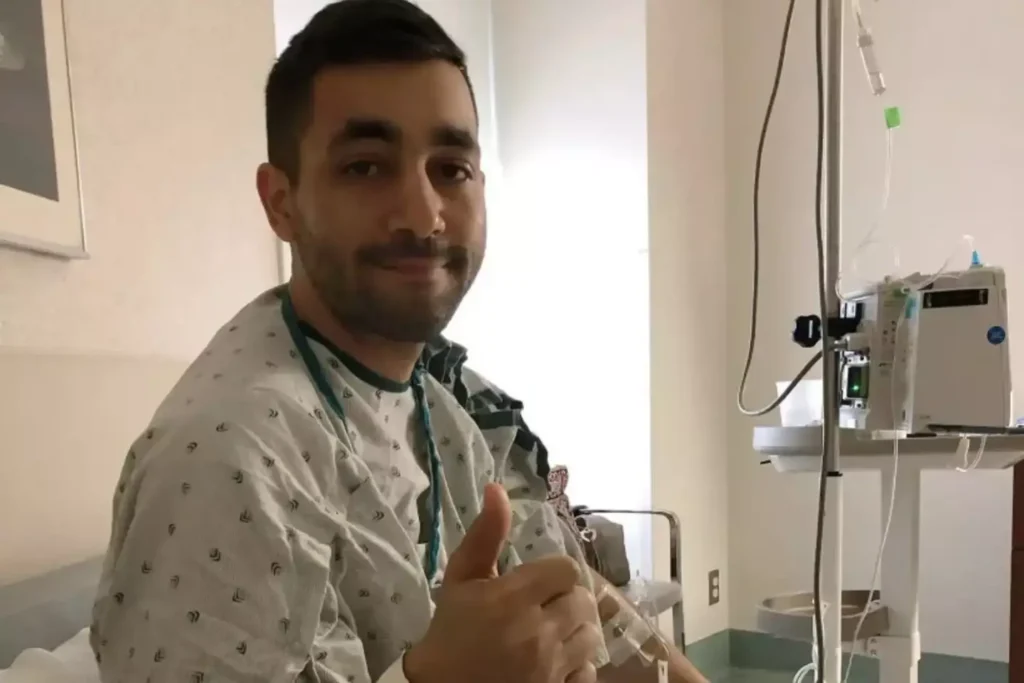Joe Faratzis, now 34, was diagnosed with stage 4 colorectal cancer at the age of 28, a diagnosis that shocked him and changed his life forever. Reflecting on his journey, he openly shares the six warning signs of cancer that he ignored, which led to his advanced stage diagnosis. His story serves as a powerful reminder of the importance of early detection and the need to listen to your body before it’s too late.
The Early Signs He Overlooked
In 2019, Faratzis, a TMZ producer, began noticing symptoms that he brushed off as minor health issues. It wasn’t until months of ignoring these signs that he finally sought a colonoscopy, which revealed the devastating truth: he had stage 4 colorectal cancer. Now, Faratzis is urging others to take screenings seriously and recognize the warning signs early.
1. Sweating and Night Sweats
Night sweats, chronic fatigue, and unexplained weight loss can sometimes signal advanced colon cancer, according to Dr. Cathy Eng, a professor at Vanderbilt University Medical Center. Faratzis experienced intense night sweats but dismissed them, not recognizing their connection to something far more serious.
2. Lower Right Abdominal Pain
Pain in the lower right abdomen can indicate problems with the ascending colon, a key area in the digestive system. Faratzis experienced this pain early on but failed to connect it to a potential issue with his colon, downplaying it instead of seeking medical advice.

3. Frequent Bathroom Trips
Faratzis also noticed that he needed to use the bathroom more frequently than usual, an odd change that he ignored. Multiple trips to the bathroom can be a sign of colorectal cancer, yet Faratzis did not recognize this change as a warning sign until much later.
4. Abdominal Cramps When Bending Over
Abdominal cramps, especially when bending over, were another symptom that Faratzis ignored. He experienced intense discomfort when bending, attributing it to something minor. In hindsight, he now recognizes this pain as an important clue that should have been addressed sooner.
5. Constipation and Cramps
Along with abdominal cramps, Faratzis dealt with constipation, a common symptom of colorectal cancer. Despite feeling these symptoms, he did not take action right away. It was another warning sign that went unheeded, delaying the recognition of a much bigger problem.
6. Blood in Stool
The most alarming symptom came when Faratzis noticed blood in his stool. Initially, he attributed it to hemorrhoids, but when the blood became more noticeable, he finally sought medical attention. This was the “big catalyst” that motivated him to take his symptoms seriously.
His Journey to Recovery
After his stage 4 diagnosis, Faratzis underwent extensive treatments, including chemotherapy, surgery, and operations to remove cancerous lesions from his liver and lungs. By 2023, he received his first clear CT scan, marking a turning point in his recovery. One year later, in April 2024, Faratzis celebrated his one-year milestone of clear scans, a significant achievement that gave him hope for the future.
The Importance of Early Detection
Faratzis regrets not seeking medical attention earlier. He believes that if he had acted on his symptoms in 2019, his diagnosis might not have reached such an advanced stage. Now, he is a passionate advocate for early screenings and detection, emphasizing that “early detection could save your life.”
His message is clear: paying attention to your body and addressing unusual symptoms promptly can be life-saving. Faratzis’ journey highlights the critical role early detection plays in preventing cancer from advancing and becoming more difficult to treat.
Conclusion
Joe Faratzis’ story is a cautionary tale for anyone experiencing persistent, unusual symptoms. Early detection and timely action are key to catching cancer before it reaches an advanced stage. Knowing the warning signs of cancer and taking them seriously could ultimately be the difference between life and death.
Please SHARE this article with your friends and family to spread the important message of early detection and the signs of cancer.